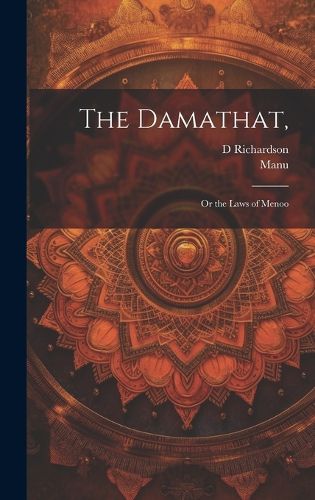Readings Newsletter
Become a Readings Member to make your shopping experience even easier.
Sign in or sign up for free!
You’re not far away from qualifying for FREE standard shipping within Australia
You’ve qualified for FREE standard shipping within Australia
The cart is loading…






Written by the ancient Indian sage Manu, The Dama That (also known as The Laws of Manu) is a foundational text of Hindu law and ethics. This translation, by D. Richardson, provides readers with a clear and accessible rendering of Manu's teachings, which include guidance on moral behavior, family roles, and social hierarchy. Though written over two thousand years ago, The Dama That continues to be a source of inspiration and guidance for people around the world.
This work has been selected by scholars as being culturally important, and is part of the knowledge base of civilization as we know it.
This work is in the "public domain in the United States of America, and possibly other nations. Within the United States, you may freely copy and distribute this work, as no entity (individual or corporate) has a copyright on the body of the work.
Scholars believe, and we concur, that this work is important enough to be preserved, reproduced, and made generally available to the public. We appreciate your support of the preservation process, and thank you for being an important part of keeping this knowledge alive and relevant.
$9.00 standard shipping within Australia
FREE standard shipping within Australia for orders over $100.00
Express & International shipping calculated at checkout
Written by the ancient Indian sage Manu, The Dama That (also known as The Laws of Manu) is a foundational text of Hindu law and ethics. This translation, by D. Richardson, provides readers with a clear and accessible rendering of Manu's teachings, which include guidance on moral behavior, family roles, and social hierarchy. Though written over two thousand years ago, The Dama That continues to be a source of inspiration and guidance for people around the world.
This work has been selected by scholars as being culturally important, and is part of the knowledge base of civilization as we know it.
This work is in the "public domain in the United States of America, and possibly other nations. Within the United States, you may freely copy and distribute this work, as no entity (individual or corporate) has a copyright on the body of the work.
Scholars believe, and we concur, that this work is important enough to be preserved, reproduced, and made generally available to the public. We appreciate your support of the preservation process, and thank you for being an important part of keeping this knowledge alive and relevant.